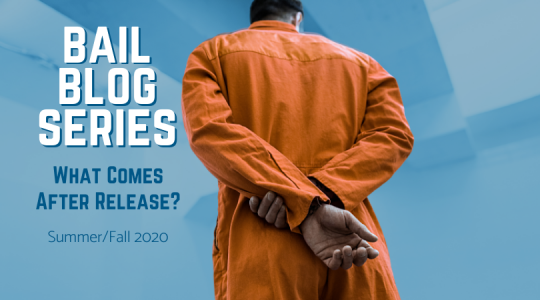
Until now in this series, I’ve been focusing on the time that people unjustly spend in pretrial detention. Interviews with people like Lance* and George* (introduced in previous blog posts here and here) have shown first-hand the cruelty of present jail conditions and the confusion with which cases are reset and delayed. Lance and George have characterized their time inside the Harris County Jail as chaotic, frightening, and assaultive—a punishment for a crime they have yet to be found guilty of. These experiences are taking place against the backdrop of the COVID-19 pandemic, where the consequences of being poor now come with the possibility of contracting a deadly virus.
These stories have irreversibly changed my perspective of the bail bond system. I no longer see it as a system of financial surety and risk management, but one intended to ensure that America’s most vulnerable populations remain that way.
But what happened after George, Lance, and others like them were able to scrape together the money needed to make bond? Getting out of jail is just the first hurdle in a series of uphill battles that people face. After someone is released, their economic and social reintegration are crucial. Financial responsibilities distrupted by detention must be addressed, and relationships that cracked must be rebuilt. This is where the individuals I interviewed diverged greatly in their experiences, with some faltering and some falling.
***
One of the more visible economic challenges facing people after pretrial detention are the financial responsibilities that have piled up during that period. Missed rent, car payments, utilities, and more add up to a huge economic strain, especially given the inability to work while incarcerated. James*, a self-employed contractor, said that his two-week detention forced him to lose thousands of dollars in contracts: “I lost a couple contracts and I had to pay some money back. I already got the materials [for the client]…. [H]e paid for the material, so I had to give him his money back because his material has been at my shop for two weeks.” Lost work pushed James’s bank account “in the negative…. I owe the bank money. I’m living with my sister.… It put me into strain.” And for many people, it’s worse than money being tight. Prolonged pretrial detention can make it impossible to ‘bounce back’ by forcing individuals to lose their apartments, cars, and even jobs. When James considered what would have happened if he hadn’t been bailed out, he made it clear: “I wouldn’t have any livelihood. I wouldn’t even feel like a man.”
Job security is particularly concerning, as system-impacted people must be economically stable to ensure a successful reentry and the ability to support themselves up to and after their court date. Lance painted a bleak picture of the difficulty of finding work post-release, saying, “Only difference [after making bond] is the scenery. And it’s because people don’t want ‘criminals’ to work for them. So if you got that X on your back, it’s all you need. They’re gonna turn around and make you walk out of their business because they want nothing to do with you.”
During the pandemic, job security for these individuals is both more threatened and more important than ever. For many, financial security and the ability to support oneself are the key factors that separate relative safety from complete exposure to the virus. This has forced Lance to navigate an even harsher job market: “I still can’t find a job because COVID’s going on and, like I said earlier, businesses really don’t like having people like me—it makes a bad image for their business.”
***
A less visible, but arguably equally difficult, aspect of release is navigating interpersonal networks. Over the course of pretrial detention, many people I interviewed faced severe strains in their relationships with family and friends, leaving them frustrated, hurt, and socially isolated. Post-release, these relationships changed in different ways—some people, like James, reaffirmed the positive impact of release: “[My life on release] is way different because…I can handle my own business. I don’t have to call anybody to handle my business for me…. I can take care of my kids. I can actually see my kids.” Even outside of his family, James found positivity in the relationships that he couldn’t have inside jail: “My friends, they actually embrace me…. They understand what’s going on.”
Lance, on the other hand, faced a catch-22. If he hadn’t been able to make bond, he knew that he “wouldn’t hear from nobody.” However, his release didn’t repair the damage between himself and his family, and his cynicism was clear: “My family looks at me the same way the world looks at me—like I’m a ‘criminal.’ Like I don’t know how to be a regular human.… [But] I could care less what anybody thinks of me because that’s what’s gonna drag you down in the future.”
While I was able to interview James and Lance on this topic, there were cases where frayed relationships prevented me from even getting to that point. By calling relatives of people recently released on bond, I learned of instances where family members hadn’t heard from releasees in days, if not weeks. The long-term consequences of this unstable network, as well as strained relationships more generally, make it more difficult for people in pretrial detention to reintegrate successfully. The lack of social ties is mentally and emotionally damaging and makes it even harder for people, already ostracized by society, to find their place in it.
***
After a period in pretrial detention and eventually making bond, the fallout looks different for everyone. While some can shift back into their lives fairly easily, too often the consequences are financially, physically, and emotionally devastating. The constant state of uncertainty that hangs in the air is even more significant with the added uncertainty of the coronavirus pandemic. These strains make it difficult for people to address their charges and move forward with their lives. It points to a justice system that pulls people in and, and once someone is in it, does everything it can to keep them there.
*Personally identifiable information, such as names and charges, have been altered to protect individual privacy.
This blog post is part of a series sharing first-person accounts of the bail system in Harris County. Through interviews with system-impacted people, the author explores stories of the local justice system. Read previous posts in this series here, here, and here.
